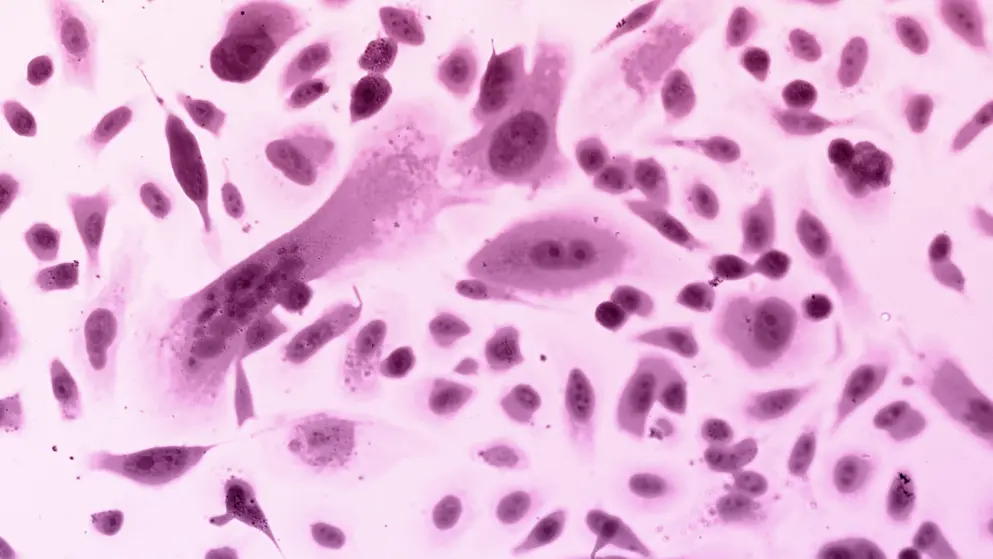
New data presented at ASCO GU confirm survival benefits and favorable safety profile of darolutamide across different subgroups of patients with metastatic hormone-sensitive prostate cancer
New subgroup data from the Phase III ARASENS trial show overall survival (OS) benefits of darolutamide plus androgen deprivation therapy (ADT) in combination with docetaxel in patients with high and low-volume, as well as high and low-risk, metastatic hormone-sensitive prostate cancer (mHSPC), compared to ADT with docetaxel
The overall incidence of adverse events continues to be similar between treatment arms. The full results were presented at an oral presentation during the ASCO GU Congress 2023 and simultaneously published in the Journal of Clinical Oncology.
“These latest findings from the ARASENS trial continue to reinforce the strong efficacy and favorable safety profile of darolutamide in mHSPC,” said Maha Hussain, M.D., Genevieve Teuton Professor of Medicine in the Division of Hematology Oncology, Department of Medicine, and the Deputy Director at the Robert H. Lurie Comprehensive Cancer Center of the Northwestern University Feinberg School of Medicine, Chicago, USA. “The growing data from the ARASENS trial continue to demonstrate darolutamide’s value in treating patients with mHSPC. The benefit is especially in those with high-volume or high-risk disease. They also provide treating physicians with greater insight into the mHSPC patient population that may benefit from this therapy.”
In the ARASENS trial , patients were randomized 1:1 to receive darolutamide plus ADT in combination with docetaxel versus placebo plus ADT with docetaxel. High-volume disease was defined as visceral metastases and/or greater than 4 bone metastases with greater than 1 beyond the vertebral column/pelvis, as delineated in the CHAARTED criteria. High-risk disease was defined using the LATITUDE criteria, which includes greater than 2 risk factors: a Gleason score of greater than 8, greater than 3 bone lesions, and the presence of measurable visceral metastasis. Of 1,305 patients in the full analysis set, 1,005 (77%) had high-volume disease, 912 (70%) had high-risk disease, 300 (23%) had low-volume disease, and 393 (30%) had low-risk disease.
showed that darolutamide plus ADT in combination with docetaxel prolonged OS in high-volume disease (hazard ratio [HR]=0.69; 95% CI: 0.57-0.82), compared to ADT with docetaxel. A consistent OS benefit was observed in both high-risk (HR=0.71; 95% CI; 0.58-0.86) and low-risk (HR=0.62; 95% CI: 0.42-0.90) disease. In the smaller group of patients with low-volume disease, the results are suggestive of a survival benefit with darolutamide (HR, 0.68; 95% CI, 0.41 to 1.13). Additionally, when compared to the ADT plus docetaxel arm, the darolutamide combination arm showed benefit for key clinically relevant secondary endpoints across all disease volume and disease risk subgroups. Incidences of treatment-related adverse events across subgroups were consistent with the overall ARASENS population.
Only 30% of those diagnosed with mHSPC will survive five years or more after diagnosis. Most people with mHSPC eventually progress to metastatic castration-resistant prostate cancer (mCRPC), a condition with limited long-term survival.
The results of the subgroup analysis build on existing data from the ARASENS trial, as well as the overall population, which show that darolutamide plus ADT in combination with docetaxel significantly reduces the risk of death in patients with mHSPC by 32.5% (HR=0.68; 95% CI 0.57-0.80; P<0.001), compared to adt with docetaxel. benefits were also seen across quality of life and patient relevant endpoints including the ability to maintain quality of life with control of disease-related physical symptoms and pain.></0.001),>
Darolutamide plus ADT in combination with docetaxel was recently recommended for EU marketing authorization for the treatment of mHSPC by the European Medicine Agency’s Committee for Medicinal Products for Human Use (CHMP), with a final decision expected in the coming months. The compound is already approved in its second indication, mHSPC, in a number of markets including the U.S. under the brand name Nubeqa. Filings in other regions are underway or planned. Ongoing reviews are also being conducted under the FDA Oncology Center of Excellence's (OCE) Project Orbis initiative, which provides a framework for concurrent submission and review of cancer treatments among participating international health authorities.
See- "Darolutamide Plus Androgen-Deprivation Therapy and Docetaxel in Metastatic Hormone-Sensitive Prostate Cancer by Disease Volume and Risk Subgroups in the Phase III ARASENS Trial"-Maha Hussain ,MD; Bertrand Tombal , MD, PhD; Fred Saad , MD; Karim Fizazi ,MD, PhD; Cora N. Sternberg , MD; E. David Crawford, MD.et al.,DOI: 10.1200/JCO.23.00041 Journal of Clinical Oncology.Published online February 16, 2023.

